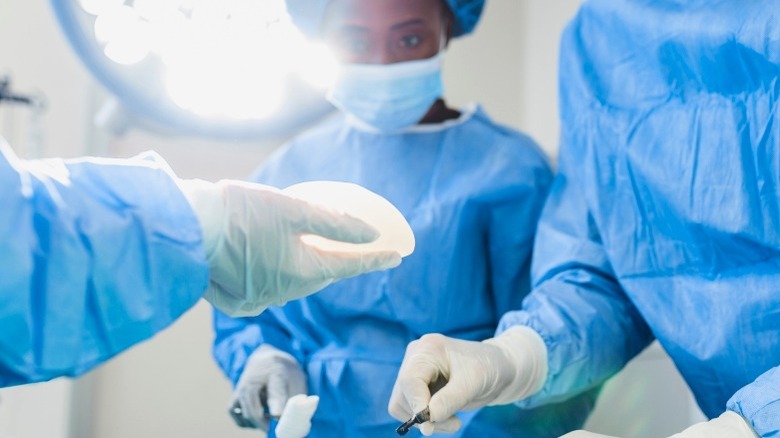What's The Difference Between Silicone And Saline Breast Implants?
Those who are unfortunately diagnosed with breast cancer become members of a large community. Aside from lung cancer, breast cancer is diagnosed more than any other cancer in American women, and roughly 13% of them will be diagnosed with invasive breast cancer during their lifetime (via BeastCancer.org). In fact, close to 340,000 women are expected to be diagnosed with some form of breast cancer in 2022.
While these are sizable numbers, the good news is that breast cancer diagnoses have been decreasing over the past decades. You would think this means there are fewer breast reconstruction surgeries; however, these surgeries are actually trending up, according to the American Society of Plastic Surgeons. Health experts believe this is due to a combination of factors, including previously delayed surgeries, revision surgeries, and more patients choosing to have a prophylactic bilateral mastectomy to reduce breast cancer risk.
If you are someone who has been diagnosed with breast cancer and chooses to have a mastectomy, your primary reconstruction options involve silicone or saline implants. But what's the difference? And what do you need to consider before making your final decision?
Silicone implants vs. saline implants
Silicone implants became known to the public in the early 1960s, according to the experts at WebMD. While they grew in popularity, they reportedly came with potential risks. Despite the inconclusive research, there were reports of silicone implants rupturing and causing serious health issues. As a result, the U.S. Food and Drug Administration (FDA) banned silicone breast implants from 1992 to 2006. An exception was made for those who needed reconstructive surgery as a result of breast cancer. The FDA then approved only some types of silicone breast implants, after more research concluded that there was no connection between any health issues and the silicone gel implant.
Saline implants are considered safe (via WebMD). If they rupture, you would immediately feel it and luckily, only harmless salt water would enter your system. However, if a silicone implant ruptures, it is much harder to detect and the rupture is often only discovered during an MRI. In the meantime, loose silicone has already been entering your body. While this is not considered unsafe, your doctor will most likely recommend that you have the loose silicone and implant removed. Many feel silicone implants deliver better aesthetic results and also feel more natural than saline implants.
There are other differences you will want to consider along with other factors, such as your body type. While the decision will ultimately be up to you, your doctor will be able to help you determine the best implant for your circumstances.


